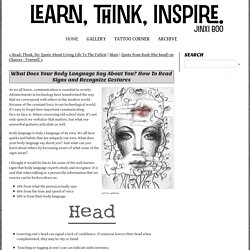

47 Mind-Blowing Psychological Facts You Should Know About Yourself. I’ve decided to start a series called 100 Things You Should Know about People.

As in: 100 things you should know if you are going to design an effective and persuasive website, web application or software application. Or maybe just 100 things that everyone should know about humans! The order that I’ll present these 100 things is going to be pretty random. So the fact that this first one is first doesn’t mean that’s it’s the most important.. just that it came to mind first. Dr. <div class="slide-intro-bottom"><a href=" class="sl-start"> »</a></div>
How to Detect Lies - body language, reactions, speech patterns. Interesting Info -> Lying Index -> How to Detect Lies Become a Human Lie Detector (Part 1) Warning: sometimes ignorance is bliss.

After gaining this knowledge, you may be hurt when it is obvious that someone is lying to you. The following deception detection techniques are used by police, forensic psychologists, security experts and other investigators. Introduction to Detecting Lies: This knowledge is also useful for managers, employers, and for anyone to use in everyday situations where telling the truth from a lie can help prevent you from being a victim of fraud/scams and other deceptions. This is just a basic run down of physical (body language) gestures and verbal cues that may indicate someone is being untruthful. If you got here from somewhere else, be sure to check out our Lie Detection index page for more info including new research in the field of forensic psychology. Signs of Deception: Body Language of Lies: • A person who is lying to you will avoid making eye contact.
Bored? Top Ten Psychology Videos. Cognitive to clinical to social, the many applications of psychology reveal profound thoughts, human frailties and strengths.

These are some of the best results, framed in video players. 1. An Unquiet Mind: Personal Reflections on Manic-Depressive Illness. Kay Redfield Jamison doesn’t just suffer from bipolar disorder, she literally wrote the book. She co-authored the comprehensive textbook Manic-Depressive Illness: Bipolar Disorders and Recurrent Depression while doing research as a Professor of Psychiatry at Johns Hopkins. 2. 3. 4. 5. Your Amazing Brain. Portrait of an ISFJ. As an ISFJ, your primary mode of living is focused internally, where you takes things in via your five senses in a literal, concrete fashion.

Your secondary mode is external, where you deal with things according to how you feel about them, or how they fit into your personal value system. ISFJs live in a world that is concrete and kind. How to Win Friends and Influence People. Six Ways To Make People Like You Become genuinely interested in other people.Smile.

Remember that a man's name is to him the sweetest and most important sound in the English language. Be a good listener. Www.som.org/1dreams/symbols.htm. 25 Most Common Symbols The 25 Most Common Images appearing in People's Dreams.

What Does Your Body Language Say About You? How To Read Signs and Recognize Gestures - Jinxi Boo - Jinxi Boo. Art by LaetitziaAs we all know, communication is essential in society.

Advancements in technology have transformed the way that we correspond with others in the modern world. Because of the constant buzz in our technological world, it's easy to forget how important communicating face-to-face is. When conversing old-school style, it's not only speech we verbalize that matters, but what our nonverbal gestures articulate as well.
Body language is truly a language of its own. We all have quirks and habits that are uniquely our own. 10% from what the person actually says40% from the tone and speed of voice50% is from their body language. Lowering one's head can signal a lack of confidence. Pushing back one's shoulders can demonstrate power and courageOpen arms means one is comfortable with being approached and willing to talk/communicate.